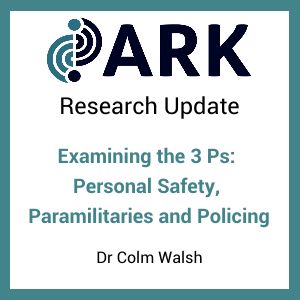Examining the 3 Ps: Personal Safety, Paramilitaries and Policing
Dr Colm Walsh

One of the most enduring socio-political issues affecting the population of Northern Ireland is the legacy of conflict. The ‘Fresh Start’ agreement, published by the UK and Irish governments in 2015 set out strategic proposals for addressing some of these most challenging issues. This vision became enshrined in the Northern Ireland Executive’s Programme for Government 2016-2021.
In order to operationalise this cross-departmental government programme, our project team and board was established and a three-person Independent Reporting Commission (IRC) was convened.
The recommendations from IRC proposed four key thematic areas and this directly informed the 2016 Executive Action Plan:
- Promoting lawfulness
- Support for transition
- Tackling criminality
- Addressing systemic issues
In their second report, the IRC (2019) reaffirmed a commitment to a twin track approach, that is, combining policing and justice efforts alongside activities that will better understand socio-economic issues facing communities where paramilitaries are most active and measurably address these in an evidence-informed way.
To complement the range of administrative and organisational data that is available to the Programme Team, questions on community safety and perceptions of paramilitary activity have been asked in the Northern Ireland Life and Times (NILT) and Young Life and Times (YLT) surveys since 2017. Topics included respondents’ perceptions of the community that they live in with regard to personal safety, attitudes towards law, justice and policing, perceptions of crime, drugs and antisocial behaviour and attitudes towards paramilitaries.
This Research Update explores data from the NILT and YLT surveys, with a focus on three strategic priority areas referred to as the ‘3 P’s’: Personal Safety, Policing and Paramilitaries.
